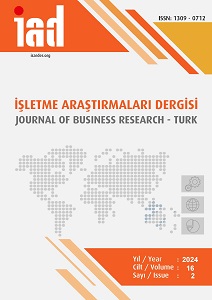Sivil Havacılıkta Gece Çalışmasının İş Yaşam Dengesi, Algılanan Stres ve Mental İyi Oluş Açısından Değerlendirilmesi
Evaluation of Night Work in Civil Aviation in Terms of Work Life Balance, Perceived Stress and Mental Well-Being
Author(s): Seda Mumlu KaranfilSubject(s): Organizational Psychology, Health and medicine and law, Socio-Economic Research, Transport / Logistics
Published by: Orhan Sağçolak
Keywords: Civil aviation; Night work; Work life balance; Mental well-being; Perceived stress;
Summary/Abstract: Purpose – With the development of industrial relations, a 7/24 service understanding has been adopted. In the aviation sector, the supply and demand for 7/24 service continues. In a 24-hour period, work between 20:00 and 06:00 and not exceeding 7.5 hours is called night work. The health conditions of the people who will work at night should be suitable for night work, but night work also causes a number of health problems for employees. The first of these is due to the fact that the person who needs to sleep during the active and bright hours of the day cannot allocate balanced time for work and family. Another problem is the psychological problems and stress caused by the disruption of the circadian rhythm of the circadian rhythm by working at night when the individual should sleep and rest. In this context, the study aims to determine the effect of work-life balance on the stress perceived by employees and whether mental well-being plays a mediating role in this effect. Design/methodology/approach –226 people working in the aviation sector in Istanbul participated in the study. The research data were obtained by questionnaire method and the data were analyzed with SPSS 24 analysis program and Process Macro (model 4). Findings – According to the findings of the study, it was determined that the deterioration of employees' work-life balance significantly affects their perceived stress and mental well-being has a moderate mediating role in this effect. In addition, it was determined that employees' work-life balance, perceived stress and mental well-being did not differ significantly according to gender, marital status, education and age. Discussion – The findings obtained reveal that it is important to implement some regulations that increase the work-life balance of individuals who work at night, especially in terms of reducing perceived stress and mental well-being.
Journal: İşletme Araştırmaları Dergisi
- Issue Year: 16/2024
- Issue No: 2
- Page Range: 1116-1134
- Page Count: 19
- Language: Turkish

